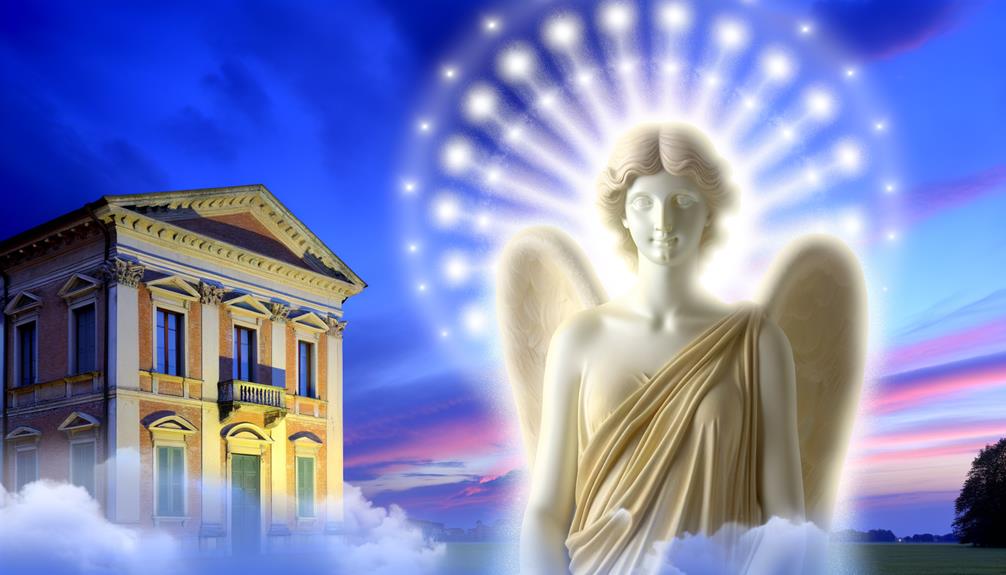Angelo Name Meaning and Origin
Angelo, of Latin origin, means "messenger" or "angel." The name is deeply rooted in ancient Roman and Christian traditions, deriving from the Latin "angelus" and Greek "angelos." Historically, Angelo signified a divine messenger, reflecting strong religious symbolism in Christianity. Its cultural influence spans art and literature, symbolizing purity and spiritual guidance.
The name has international variants such as Ángel in Spanish and Ange in French. Modern usage of Angelo maintains its classic appeal, continuing to be a popular choice.
The name's rich etymological history and cultural significance provide further layers of meaning worth exploring.

Key Takeaways
- Angelo has Latin origins and means 'messenger' or 'angel,' derived from the Greek 'angelos.'
- Historically, it was associated with divine messengers in early Roman and Christian traditions.
- The name symbolizes purity, protection, and spiritual guidance in Christian and monotheistic religions.
- Artistic representations of Angelo highlight divine themes, from Renaissance art to contemporary works.
- Modern usage of Angelo maintains popularity for its classic charm and angelic connotations.
Historical Background
The name Angelo, of Latin origin, has a rich historical background that can be traced back to ancient Roman and Christian traditions. In early Rome, the name was associated with messengers, aligning with the Latin word 'angelus,' meaning messenger or angel.
With the rise of Christianity, Angelo became more prevalent, symbolizing a divine messenger or celestial being. This dual significance underscores the name's enduring appeal in various cultures and epochs.
Historical records indicate that the name was popular among early Christians, who often named their children Angelo as a tribute to their faith. Its continued usage through centuries highlights its ingrained cultural and religious significance, making Angelo not just a name, but a representation of historical continuity and spiritual reverence.
Etymology
Rooted in the Latin term 'angelus,' the etymology of the name Angelo reflects its origins as a word meaning 'messenger' or 'angel.'
The term 'angelus' itself derives from the Greek 'angelos,' which similarly signifies a divine messenger. This linguistic lineage underscores the name's association with spiritual and divine connotations, emphasizing its role in religious texts and traditions.
Over centuries, the name Angelo has been adopted in various cultures, maintaining its core meaning while adapting to linguistic and phonetic variations. This historical evolution illustrates the name's enduring relevance and its deep-seated roots in classical languages, revealing a rich tapestry of etymological development that has shaped its contemporary usage.
Cultural Significance
The name Angelo holds profound cultural significance, deeply rooted in its religious symbolism, particularly within Christian traditions where it is associated with angels and divine messengers.
Artistic representations of Angelo have pervaded various forms of art, from Renaissance paintings to contemporary media, often symbolizing purity and spiritual guidance.
Moreover, historical context reveals that the name has been borne by notable figures throughout history, adding layers of cultural and societal relevance to its meaning.
Religious Symbolism
In various religious contexts, the name Angelo carries profound symbolic significance, often representing divine messengers and spiritual guardians. Rooted in the Greek word 'angelos,' meaning 'messenger,' the name Angelo is emblematic of celestial beings tasked with conveying divine will.
In Christianity, angels are seen as intermediaries between God and humanity, embodying purity, protection, and guidance. The name Angelo hence evokes notions of divine communication and moral integrity. In the context of Catholicism, angels hold a special place, often invoked for protection and supplication.
Additionally, in other monotheistic religions, angelic figures similarly serve as emissaries of the divine, reinforcing the spiritual gravitas of the name Angelo. Therefore, the name embodies deep religious and spiritual dimensions.
Artistic Representations
As a reflection of its profound religious significance, the name Angelo has inspired countless artistic representations across diverse cultures, symbolizing purity, divinity, and moral virtue. From Renaissance paintings to contemporary sculptures, the portrayal of angelic figures often embodies the essence of the name Angelo, emphasizing celestial themes and ethereal beauty. These artistic depictions not only celebrate the divine but also serve as moral exemplars, reinforcing cultural and spiritual ideals.
In the context of art, the name Angelo has been associated with various mediums:
| Medium | Notable Works |
|---|---|
| Painting | Michelangelo's Sistine Chapel |
| Sculpture | Bernini's Angel Statues |
| Literature | Dante's Divine Comedy |
| Music | Handel's Messiah |
Such representations continue to shape cultural narratives and artistic expressions.
Historical Context
Rooted in ancient traditions, the name Angelo has carried significant cultural weight across various epochs, influencing societal values and religious practices.
Originating from the Greek word ‘angelos,’ meaning ‘messenger,’ the name was adopted into Latin as ‘Angelus’ and became prevalent in Christian contexts. The concept of angels as messengers from the divine has deep roots in multiple religious traditions, but the term “angel” as we understand it today is largely shaped by Christian theology. In this context, angels are often depicted as benevolent beings who serve as intermediaries between God and humanity, delivering messages, offering protection, and carrying out divine interventions. The Avila name origin may also be traced back to the cultural and religious significance of angels, reflecting a deep connection to faith and spirituality. The Avila name origin may also indicate a geographical or familial connection to a place named Avila, such as the Spanish city of Ávila. Additionally, the use of the name Avila may also be influenced by its association with strength and protection, as angels are often seen as guardians in Christian belief. The name Avila carries with it a sense of reverence and connection to the divine, making it a meaningful choice for those seeking a name with spiritual significance.
During the Middle Ages, the name Angelo was often given in homage to angelic figures, symbolizing purity and divine communication. Its prominence surged during the Renaissance, particularly in Italy, reflecting the era's emphasis on classical virtues and spiritual rebirth.
The name's adoption by prominent figures, such as the artist Michelangelo, further embedded its cultural resonance, linking it to creativity and intellectual pursuit.
Hence, Angelo remains a name intertwined with historical and cultural significance.
Popularity Over Time
The name Angelo has experienced fluctuating levels of popularity over the past century, reflecting broader cultural and social trends. Historically, its usage has been influenced by various factors:
- Early 20th Century: Angelo gained moderate popularity in the United States, especially among families with Italian heritage.
- Mid-20th Century: The name saw a decline, likely due to shifting naming conventions and the rise of more modern names.
- Late 20th Century: Renewed interest arose, possibly driven by a resurgence in traditional and classical names.
- 21st Century: Angelo remains relatively stable in popularity, consistently ranking within the top 300 names, demonstrating enduring appeal across generations.
These trends underscore the name's resilience and its ability to adapt within diverse cultural contexts.
Famous Namesakes
Celebrating the name Angelo, numerous remarkable individuals across various fields have left a lasting impact, illustrating the name's broad appeal and cultural significance.
In the world of art, Michelangelo Buonarroti, often referred to simply as Michelangelo, stands as a towering figure of the Renaissance. His masterpieces, including the Sistine Chapel ceiling, highlight the creative genius associated with the name.
In modern times, Angelo Badalamenti, a prolific composer, is renowned for his work on the soundtracks of David Lynch's films, particularly 'Twin Peaks.'
In sports, Angelo Dundee, a legendary boxing trainer, is celebrated for his pivotal role in shaping the careers of champions like Muhammad Ali.
These examples underscore the diverse arenas in which individuals named Angelo have excelled.
Variations and Nicknames
The name Angelo has various common nicknames, such as Angie and Gelo, which reflect a more casual and affectionate usage.
Internationally, it manifests in diverse forms like Angel in Spanish and Angelos in Greek, showcasing its widespread appeal and adaptability.
These variations not only highlight the name's linguistic flexibility but also underscore its cultural significance across different regions.
Common Angelo Nicknames
Considering the rich cultural and linguistic backgrounds from which the name Angelo originates, a variety of nicknames and diminutives have emerged, each reflecting unique regional and familial influences. These affectionate and practical variations often simplify pronunciation and convey endearment.
Commonly used nicknames for Angelo include:
- Angie: A familiar and gender-neutral option.
- Gelo: A playful and modern diminutive, particularly popular among younger generations.
- Lino: A traditional and affectionate form, emphasizing the latter part of the name.
- Nelo: A distinctive, yet simple, variation that is easy to remember.
Each of these nicknames offers a glimpse into the personal and cultural nuances that shape the name Angelo, demonstrating its adaptability and enduring appeal.
International Angelo Variations
Numerous international variations of the name Angelo, each with its own distinct cultural and linguistic flavor, highlight the name's global resonance and adaptability. From the Italian "Angelo" to the Spanish "Ángel," each variant offers a unique twist while preserving the name's core meaning, "angel." The following table explores some of these variations and common nicknames:
| Language | Variation | Common Nickname |
|---|---|---|
| Italian | Angelo | N/A |
| Spanish | Ángel | N/A |
| French | Ange | N/A |
| Portuguese | Ângelo | N/A |
| Greek | Angelos | N/A |
Each variation retains the celestial connotation, demonstrating the name's universal appeal and its seamless integration into diverse cultures and languages.
Angelo's Cultural Significance
Exploring the cultural significance of the name Angelo, particularly its variations and nicknames, reveals how deeply ingrained this name is within various societies and traditions. The name Angelo, meaning 'angel' in Italian, is not only popular in Italy but has also found resonance globally.
Its variations and diminutives reflect this widespread appeal:
- Angelos – The Greek variation, emphasizing its ancient roots.
- Ángel – The Spanish form, commonly used throughout Latin America.
- Angeline – A feminine variant, highlighting its versatility.
- Ange – A French diminutive, demonstrating its cultural adaptability.
Each of these variations showcases how the name has been embraced and adapted, maintaining its celestial connotations while fitting diverse cultural contexts. This universality underscores Angelo's enduring appeal.
Modern Usage
In contemporary contexts, the name Angelo is frequently chosen for its blend of classic charm and modern appeal. Its enduring popularity can be attributed to its harmonious phonetic structure and elegant simplicity, making it versatile across different cultures and languages.
Statistically, the name maintains a steady presence in baby name rankings, reflecting a consistent preference among new parents. Additionally, Angelo's association with angelic qualities and its historical roots in Italian and Greek traditions enhance its desirability.
Modern usage also sees the name embraced in various professional and creative fields, bolstering its image as both timeless and adaptable. This combination of factors ensures Angelo remains a favored choice for those seeking a name that is both distinguished and contemporary.
Conclusion
In summation, the name Angelo, with its rich historical tapestry and etymological roots in the Greek word for 'messenger,' possesses unparalleled cultural significance.
Over the centuries, its popularity has waxed and waned, reflecting broader societal trends. Renowned individuals bearing this name have further cemented its legendary status.
Contemporary variations and nicknames reveal its adaptability and enduring appeal. Truly, the name Angelo remains an epitome of linguistic elegance and timeless resonance in the annals of nomenclature.






